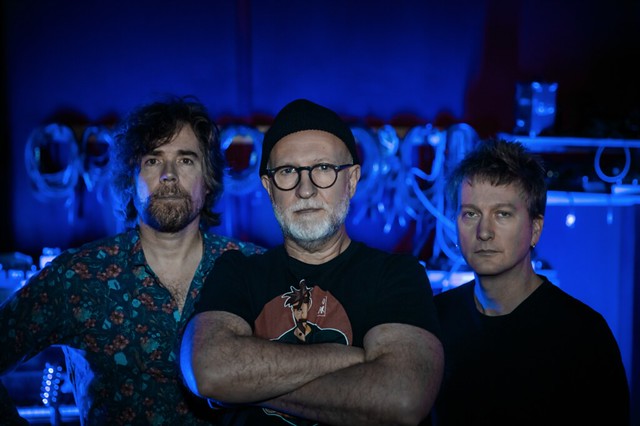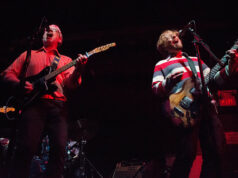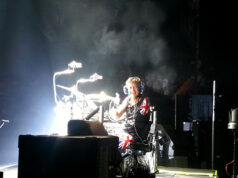
Bob Mould Band (Photo courtesy Big Hassle)
When he plays the 9:30 Club on Saturday, Bob Mould will be making a homecoming of sorts. For nearly a decade, he lived in the District, and he has a long history with the club. For a number of years at 9:30 Club, he DJ’ed at a dance party (called Blowoff) for DC’s gay community.
Over his 40-plus year career, Bob covered wide ground and left an indelible imprint on the American musical scene. A native of upstate Malone, New York, Mould left to attend Macalester College in Minneapolis, where he would found the seminal band Hüsker Dü in 1979. A fast, aggressive punk trio, their music was a bridge between the punk era and the alternative and underground scenes that formed in the early to mid ’80s. Their influence was especially potent in their base in the Twin Cities (on the Replacements, Soul Asylum, and Guided by Voices) but extended to bands as diverse as, on the one hand, Dinosaur Jr. and Nirvana, and, on the other, Uncle Tupelo and Whiskeytown. New Day Rising was listed in Rolling Stone’s top 500 albums, and several of their albums are considered classics.
After the breakup of Hüsker Dü, Bob embarked on a solo career, moving into more singer-songwriter oriented territory with the well-received, mostly acoustic Workbook. In the early ’90s, he helmed the alternative band Sugar to some of his most commercially successful work. In the 25 years since Sugar disbanded, he has continued to grow and expand his range, running the gamut from his completely self-made, distortion-filled, eponymous 1996 release, to explorations in electronic music, District’s Lines variety of styles and genres, and more pop-oriented material like Life and Times. As he describes in this interview, his latest record, last year’s Blue Hearts, is a return to his punk roots.
Parklife DC’s Mark Engleson recently spoke with Bob Mould in advance of his show at 9:30 Club on Saturday, Sept. 18. They touched on a number of subjects, including his history with the venue, his creative cycle, and what still keeps him creatively refreshed and moving forward in his career.
Bob Mould: Hey Mark Engleson, it’s Bob Mould in San Francisco. How are you today?
ME: Great! It is a gorgeous day here in DC. The remnants of the storm (Hurricane Ida) didn’t really hit us directly yesterday night, but it’s cool — it’s in the 70s. It’s bright, it’s sunny; it’s one of those beautiful early falls here you’d be familiar with from your time here.
BM: Oh gosh, I miss it. September was always my favorite month. [Laughs]
ME: I live right by a trail in Arlington. My day job has me tied up today, but hopefully, tomorrow I’ll get out to walk it for a couple of hours.
BM: Excellent! That sounds great. How are things in DC overall? I know last year was bonkers, but with masking and everything, are people being pretty good?
ME: Do you sometimes see someone on the train without a mask? Yeah, you’re not going to get 100% cooperation, but the vaccination rates are pretty strong here, as they are in most cities. The divide in everything in America now is between cities and rural environments on just about everything.
BM: Yeah.
ME: How do you like San Francisco, as compared to DC?
BM: I’ve been out here since the fall of ’09. I had a three and a half year stretch where I was splitting time between San Francisco and Berlin, Germany. The pandemic put an end to Berlin for me, because I couldn’t go back and forth, and still can’t.
San Francisco is great. Over the time I’ve been here, I’ve seen a lot of changes: the second tech wave and all that accompanies that, for good and bad. In terms of community and progressive thought, it’s all great on that front. Vaccination-wise, I think here we’re over 85% in the city, and everybody’s doing the right thing here. As far as a place to be, I love it here and, particularly in these unfortunate times, it was a real safe place to be. So I’m feeling good about all that.
Watch Bob Mould Band perform “Something I Learned Today” live in London in 2016 on YouTube:
ME: You’re playing at the 9:30 Club on Sept. 18, and I know you’ve got quite a bit of history with the club, going back a ways. Could you talk a little bit about the venue, and your feelings and history with it?
BM: I probably go back to F Street in the early 80s, going into that room and sweating it out. [Laughs] Those were crazy times. When the club moved up to the current location in the 90s, that was a great upgrade for all of us as touring musicians. Jumping up to the 2000s when I lived in DC and Blowoff started up, and how this party just became this amazing phenomenon that neither Rich nor I saw coming. The support from the club and from the community, all those years with that. It was just incredible to be down in the basement of the 9:30 Club for a year and then going up to every month for probably 9 years upstairs. I think Blowoff was 11 years total. Just great. And I’ll tell you, my friends are like, stop with how much you love DC. [Laughs]
In my time since leaving DC, I think about it a lot. I loved my life there.
ME: Since moved back to the area about 5 years ago, a number of new venues have opened. They’ve revitalized the whole Wharf area. I have noticed noticed that the artistic and musical community here is somewhat limited., probably by the cost of living. More of the musicians and writers I know gravitate to Baltimore because it’s much less expensive.
BM: That migration was happening when I lived there. I saw that happen, saw it coming. San Francisco had the same; people went to Oakland, and, when Oakland got to be too much, people left Oakland. I think that’s part of what I was talking about: good and bad effects of the tech wave here. And yeah, DC has gotten very, very expensive.
Baltimore is super fun. I used to go to Baltimore a lot, and I’ve still got friends up there in Mt. Vernon and other neighborhoods. I hear what you’re saying.
ME: I don’t drive, which means I can live in about five places in America. New York is even more expensive, and a lot of what I do for work has involved the government.
BM: Without driving, you’re pretty much looking at DC, San Diego, Seattle, I guess.
ME: Seattle’s also gotten expensive, and I know a lot of people who left it for Portland.
BM: Portland is still affordable. Tacoma is where a lot of people who are leaving Seattle are going. A lot of my friends who artists and musicians have gone to Takoma, below the airport, which is a lot more affordable.
It’s crazy times with that stuff, and it feels like artists have really been decentralized.
ME: How have you been getting through this past year and a half?
BM: At the beginning of 2020, I had all these new punk rock songs that became Blue Hearts, and I was out doing solo electric touring as a way to get my Blue Hearts in February 2020. We got the record finished by the end of the month, and, within two weeks, we were headed to lock down.
Since then, it’s run the gamut. I was nervous, I was very concerned. My partner studied virology in college and had pretty good insight as to how this might go. And he was 100% right. I was very luck to have someone, to have my better half so vigilant on both our behalves’.
Emotionally, really tough. I love my work. It’s hard work, but I love it. I didn’t realize how much I would miss it when I didn’t have work. I didn’t realize how important it was to my mental health. I had a pretty rough patch through the fall of 2020 and winter. It was a lot to contend with financially, but, mostly, just spiritually. Missing community, missing what I do, and how much I need that interaction.
In terms of creating work, it’s been slow. I’ve spent my entire adult life on cycles of touring a record and then taking time to collect all of my ideas and start writing in earnest. And then making a record, and then waiting to put the record out so that I can tour. The cycle got shattered this past year. Quite honestly, I feel like my writing cycle has been on pause. I have lots of good ideas, but I haven’t gotten that one on one from Blue Hearts yet. I’ll reenter the good creative stuff shortly, but I want to go out and read my thesis, I guess.
Watch the official music video for “American Crisis” by Bob Mould on YouTube:
ME: I dabble in writing fiction. For years, I would say, “I just need to set aside the time.” And then, all of a sudden, I had all this time, and I’d find myself just staring out the window instead of getting anything done. I don’t we realized how much structure and pressure is something we need.
BM: Absolutely. And I’m sorry to hear that it got to you, but I’m happy to hear that I’m not alone in that. You’re absolutely right. God, what a life lesson for all us.
All of these things that are just inherent in how we move forward through life and when that pause button is hit, it’s like, “What? I have all this time and I can’t do anything with it?”
ME: I’ll decide that I’m going to do this little distraction for five minutes; five minutes later, I’ve found another one. And god help me if a squirrel walks by.
BM: [Laughs] We’re all wired in unique ways, right?
ME: How long are you going out on tour for this run?
BM: This particular run with the band is, we’re doing three weeks as fast as we can around the country. My rhythm section, John Wurster and Jason Narducy, they have other projects that are ongoing. John plays with The Mountain Goats; Jason has a band called The Split Singles. We get together and o as much as we can when everybody’s schedules line up. After the three weeks of band touring, I go on with solo electric touring. [That] starts up in mid-October. In January, knock wood, that I can get to the UK to do a month of shows over there, solo electric. The hope is for more as 2022 goes on, but, right now, everything is teetering out there. Everything is in pencil past January.
ME: Are you thinking at all about what is going to follow Blue Hearts? It’s an excellent album! It sounds great, and the lyrics are so sharp.
BM: Thank you. Past that, as I mentioned earlier, I’ve got ideas gathered, but I think I will start processing all of that in earnest once we finish this band tour. The beauty of the solo tours for me is that, historically, I can go deeper into my songbook on a moment’s notice and I can .also do a lot of writing when I’m by myself six hours a day in the car. I get to the club, and I do a quick line check, and there’s another forty minutes to dabble with new ideas. I think that, after the band tour, the writing process will start in earnest with a little more focus. That’s that cycle I described.
ME: You mentioned going deeper into the songbook at a moment’s notice on those solo shows. A lot of musicians have told me that, when you’re with a man, you have to be more structured. When they’re solo, they might approach it with a general plan, but they can feel their way through it.
BM: One hundred percent. That’s exactly it. With John and Jason, we have limited time to work together. They know most of the songbook, but we do have to hone in. A couple weeks ago, I sent those guys, I said, “Here’s the starting point.” And they were like, “You’re kidding, right? This is like 75 songs.” [Laughs] “Okay, let me whittle it down a little.” Whereas for me, I may be in the car approaching a solo show, thinking about something I haven’t played in 20 years, and I can conjure that pretty quickly. But maybe it wouldn’t be ready for the stage with the band. 100% what you said; that is exactly the journey.
ME: What I hear from you, and I’ve heard it from others, is that question of whether you prefer to play with a band or solo is misguided, because it’s the variety that really keeps you going.
BM: Yeah, I would agree with that, and touching back on Blowoff, I really miss that part of my musical wheelhouses. If one can have more than one wheelhouse, I guess spokes of my wheelhouse.
I really learned a lot about set construction and reading an audience. When I used to that with other people’s music when I was DJing, that gave me a lot of insight that I didn’t have before I started DJing.
With the solo stuff, it’s more intimate and more freewheeling. With the band, it’s very structured. I think it’s great to have those different outlets that all revolve around the same discipline of music.
I’m very lucky to have all of that. It’s all different types of lights to look at. It’s pretty cool.
***
Bob Mould Band performs at 9:30 Club on Saturday.
Bob Mould Band
W/ Kestrals
9:30 Club
Saturday, Sept. 18
Doors @ 8pm
$25
All ages






